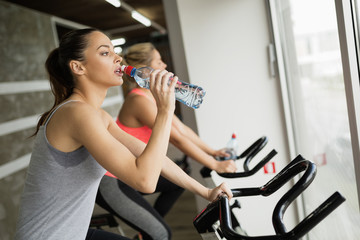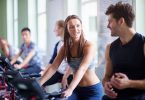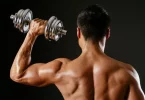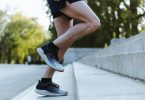Why it’s so Important to Stay Hydrated During Workouts
Hydration is one of the essential aspects of our health. Our bodies and muscles are largely made up of water, and we need to continually ensure that they remain hydrated so that we can keep performing our bodily functions optimally. Water is, in many ways, fuel for our muscles.
Hydration is important for everyone, but it is particularly important for people who enjoy sports or intense workouts, because the more you exercise, the more fluids you’ll lose through breathing and sweating, the more you will need to replace them.
What Happens When You Don’t Hydrate While Working out ?
Failing to replenish fluids while working out can result in dehydration, which is by definition the loss of more fluids than you take in. This can lead to tiredness and dizziness in the short term, which will also have negative effects on your workouts as you won’t be able to perform at the best of your abilities. Moreover, this can result in rather avoidable injuries and setbacks.
On the other hand, long-term dehydration can be dangerous, with research showing links between dehydration and urological, gastrointestinal, circulatory and neurological disorders. Chronic dehydration is a medical emergency. Water really is the key to life – without it, there isn’t much we can do.
Some studies show that dehydration can be difficult to spot, with a considerable percentage of athletes having difficulties perceiving fluid intake and loss of sweat during training.
You may have been dehydrated yourself sometimes during exercise without noticing it – all the more reason to learn about it.
Measuring Hydration
There are some ways of measuring how hydrated or dehydrated you are, although the easiest way is probably by checking the colour of your urine. The clearer it is, the more hydrated you are; the darker it is, the less hydrated you are.
A good way of measuring fluid loss during exercise is by doing what is called a ‘sweat test.’ This entails measuring your weight in ounces before and after a workout to verify your fluid loss through sweating. After measuring the difference, just add the amount of water or other fluids you have drank during this time to find out how much you have lost.
Sweat loss = (body weight before exercise – body weight after exercise) + fluid intake during exercise.
Lastly, you can use the hydration calculator from Trusted Alkaline to find out how much water you need to consume to achieve peak performance during exercise. Just fill in your details, and it will tell you the ideal amount of water you need per hour of activity.
Sports Drinks
I wanted to briefly address the issue of sports drinks as I have noticed it often comes up in these discussions.
Firstly, should you consume sports drinks during workouts? The answer to this depends on how hard you go at it. If you are into sports and intense exercise, you may want to consider sports drinks as they will keep you going for a bit longer due to their carbohydrate and electrolyte contents.
If you are into moderate amounts of exercise, however, water will work just fine, as you won’t need the extra help that sports drinks can offer.
Hydration Before Exercise
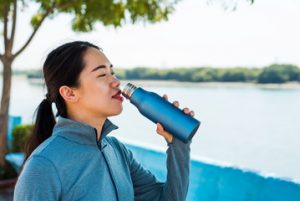
You want to make sure that you are hydrated before you begin your workout. Jumping on the treadmill if you are dehydrated will result in your core temperature rising faster than normal and your heart having to work harder.
Especially if you are going to be training in hot conditions, as the body loses its ability to cool itself and comes into contact with hot air particles; and especially if you are an older person – make sure you don’t forget this step. Hydrate before your start!
Hydration During Exercise
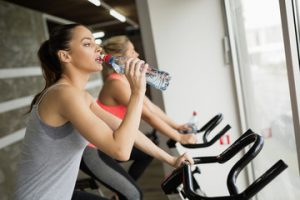
There are all sorts of factors at play when it comes to the loss of fluids during exercise – earlier I mentioned a tool you can use to measure how much water you will need per hour of workout. Finding out the optimal amount would be a good start.
Another good piece of advice is actually to listen to what your body is telling you. You will know if you’re thirsty and need replenishment – don’t ignore this beautiful machine that evolution has shaped for millions of years to survive in this environment. It can reveal more than you think.
Remember that unless you are quite literally overdoing it, pausing for a water break during your workout should barely have any impact on your gains. So don’t hesitate.
Hydration After Exercise
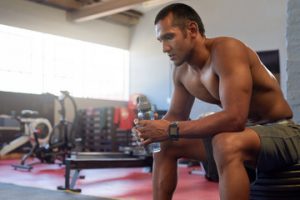
Although hydration, after you finish your workout, is perhaps not as essential as hydration before and during it; it is still an essential component of recovery. By drinking water, after you finish, you can begin replacing the fluids lost and your muscles can start to recover.
Drinking sports drinks that contain electrolytes like sodium, potassium and magnesium after you finish exercising is also beneficial for your body – you want to be careful drinking too much water after your workout. But even without replenishing your electrolytes as this may lead (although very rarely) to a medical condition called hyponatremia, which occurs when there is an imbalance of water-sodium levels in the body.
Don’t Overdo It
Ultimately, staying hydrated during intense workouts is extremely important as it results in all sorts of benefits for the body before, during and after exercising.
Despite all the benefits, however, we must always keep in mind not to overdo things. As the saying goes – everything in moderation. Even drinking too much water can have adverse effects, as we have seen with hyponatremia.
By over-hydrating you may end up undoing all the good work you put in during your workout – so don’t forget to keep that in mind too.
Thanks for reading and, I hope you can make good use of this information!
ALSO READ THESE TOO:
How To Build A Garage Gym
6 Best Exercises For A Healthy Colon

